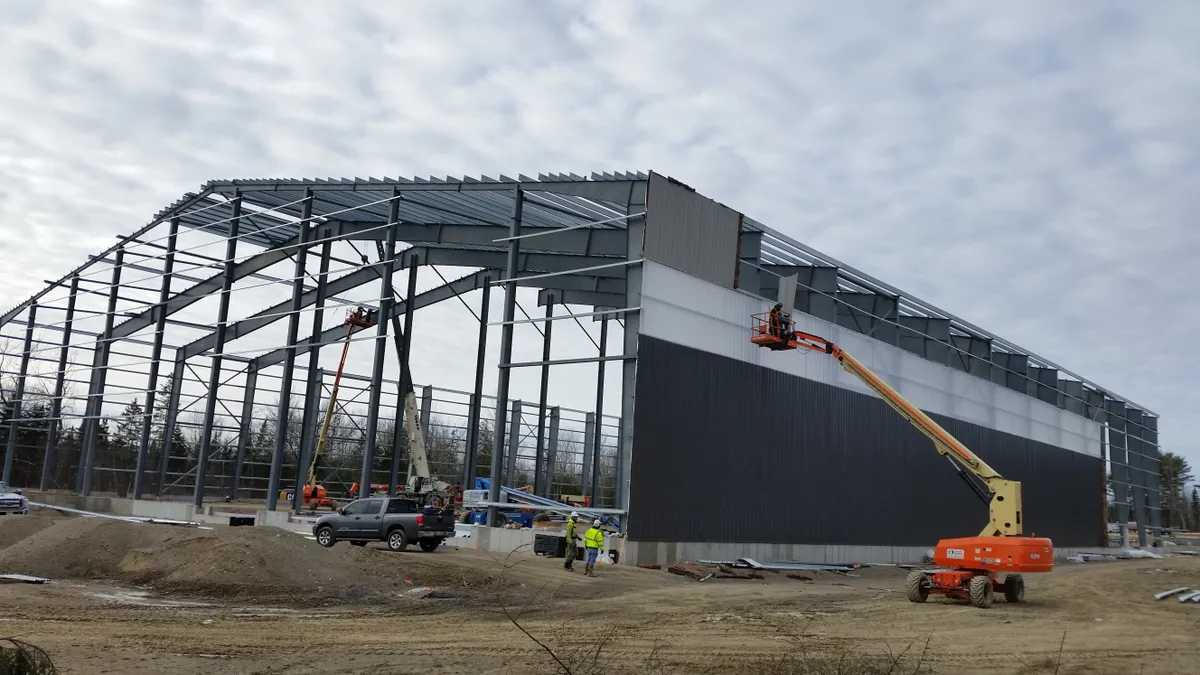UPDATE Jan. 5, 2018: Fiberight announced this week completion of $70 million in project financing for its Hampden, ME facility. $45 million came from a tax-exempt bond issuance from the Finance Authority of Maine, underwritten by Jefferies LLC. The remaining $25 million came from private equity. Fiberight also secured funding commitments for "additional projects." The company said it was in talks with municipalities and private haulers to plan future projects, but did not offer specifics.
CEO Craig Stuart-Paul said in a statement that the first phase of construction on the facility is "largely complete" and it is still on track to start accepting municipal waste during Q2. Fiberight’s facility will have a 180,000 ton-per-year capacity, according to the company. The facility will service 83 municipalities and public entities represented by the Municipal Review Committee in eastern and northern Maine under a 15-year contract. The company intends to contract with other municipalities and businesses under separate agreements.
Dive Brief:
- The Fiberight project in Hampden, ME has officially secured financial close and received the necessary conduit bonds from the Finance Authority of Maine (FAME), according to CEO Craig Stuart-Paul.
- Stuart-Paul told Waste Dive that construction is on track, with the site cleared and the initial facility structure set to be built this fall. "It looks like, fingers crossed, we’ll have steel up with a roof over us by Thanksgiving," he said. CP Group will be providing equipment for Fiberight's material recovery facility. That portion of the project is slated to open in April 2018. The other portion, which will create various biofuels from wet waste, will come online later in the year and reach peak capacity in 2019.
- The newly approved financial terms also open up the potential for Fiberight to build at least five more facilities like the Hampden project. Stuart-Paul said this would entail a similar model with communities making waste commitments and being eligible for revenue-sharing.
Dive Insight:
This Fiberight facility will be the first of its kind in the U.S., promising a more than 80% recovery rate for metal, plastic and cardboard. The remaining material will be handled through a "targeted fuel extraction" process to create cellulosic sugars, biogas and digestate fiber. The initial goal had been to have this entire system operational by April 2018, but Fiberight has scaled back expectations to say that at least the MRF portion will be online by then at risk of liquidated damages under a new agreement with its municipal partners. Residual material will be sent to a local landfill until the second phase is complete.
Stuart-Paul told Waste Dive that this multi-phase approach will help provide a better understanding of the waste stream characteristics so they can tailor the technology accordingly. Because this project has sparked so much local debate, and Fiberight has ambitions to expand, a smooth start is critical.
“We absolutely have to be sure that Maine is a showcase and it works right. A lot is riding on it," he said.
While Fiberight's project could work anywhere, Stuart-Paul sees markets with higher disposal costs such as the Northeast or certain coastal regions as the best fit. Fiberight's opening in Maine comes as prices for 189 communities represented by the Municipal Review Committee (MRC) are set to go up once their current contract with the Penobscot Energy Recovery Co. (PERC) waste-to-energy facility expires next year.
Fiberight hasn't signed up all of those communities — some will stick with PERC, others plan to use the Portland-based ecomaine WTE facility or local landfills — but more are coming on as construction progresses. PERC fought the Fiberight project with legal challenges, permit appeals and even negative radio ads last year. That has all since been resolved and the FAME board estimated that Fiberight could save communities a collective $24 million over 15 years. The outcome of this project is seen as a potential test for other alternative waste processing technologies around the U.S.














